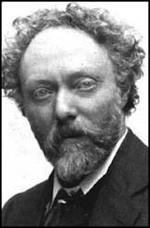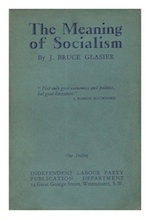An appreciation of John Bruce Glasier, written by Scottish ILP activist and social reformer MARTIN HADDOW in the 1940s.
“What the socialist movement needs is a deepening of socialist life within – something that will exalt its faith and purpose, something that will suffuse it with the socialist spirit, rather than encourage lust for smiting all things before and about in the belief that thereby it is destroying capitalism and building up the socialist state. More prophets, more poets we want, and, above all, more men and women who are socialists in nature as well as in name. But how to get them? We must make them. We must be them.”
These words were uttered by John Bruce Glasier, pioneer, poet, socialist and prince of good fellows, many years ago. But they are still true today and it would be well if all of us – old and young – would ponder over them and repeat them occasionally as a litany.
As one who has. spent more than 45 years in the movement I feel that we have lost  many of our ideals and lost the glorious vision we once had. As a comrade who writes occasionally to me puts it: “I thought socialism meant fellowship, a certain kindness of outlook towards each other’s faults and failings, but I have noticed that since a large measure of success has been attained, elected persons are jealous of one another in their struggle for limelight and position. After all what is position? An empty shell, transcient and full of worry and responsibility – but fellowship sends its warm glow right to the end.”
many of our ideals and lost the glorious vision we once had. As a comrade who writes occasionally to me puts it: “I thought socialism meant fellowship, a certain kindness of outlook towards each other’s faults and failings, but I have noticed that since a large measure of success has been attained, elected persons are jealous of one another in their struggle for limelight and position. After all what is position? An empty shell, transcient and full of worry and responsibility – but fellowship sends its warm glow right to the end.”
It was ,this great virtue of fellowship that pervaded the whole life of our old comrade Bruce and made him the universal favourite of rich and poor. No one ever received a warmer welcome than Bruce whether in the home of the Rev Dr Glass of Edinburgh, or in the studio of the great William Morris, or in the lowly ‘But and Ben’ of a colliers’ raw.
Bruce Glasier was a Glasgow laddie, born in 1859. His father was an Ayrshire farmer and his mother, whom he adored, was the daughter of a Highland crofter. He was educated at a school in Newton-on-Ayr and during the summer months this little bare-footed, curly-headed boy, tended his father’s sheep on the braes of Kyle and on the moors of Argyllshire.
In process of time the family drifted to Glasgow and, his school days coming to an end, young Bruce became a designer. At this profession he laboured succesfully for a number of years and, it is said, that despite his advanced ideas, so satisfactory was his work to his employers, that only on two occasions was he called up to choose between severing his connections with his means of livelihood or ceasing his socialist activities. Needless to say he stayed true to socialism.
Many young socialists believe that socialism began with Lenin and the Russian revolution; many old socialists claim that HM Hyndman was the father of British socialism.
While it is true that Hyndman founded the Democratic Federation in 1881, which in September 1884 became the Social Democratic Federation with a definitely socialist basis, yet we find young 19-year-old Bruce taking part in a discussion, ‘On the cause of Poverty’ – and using all the socialistic words and arguments that any socialist would use today.
In closing this debate he said: “The earth is wide and beautiful; there is more than enough for all. And why should some have none? Commerce and capital have become a greater enemy to mankind than superstition, ignorance or bigotry everywhere. Surely if there is a heaven, commmerce and merhcandising have become among the cursed of hell.”
Two years later (1880) we find him using the word socialism for the first time. He says: “I am at present writing a kind of song for the future of socialism in the same verse as my song for Nihilism.”
But even before the founding of the SDF or William Morris’s Socialist League, Glasier was active in the Irish and Highland League Movements and served on the executive that inaugurated the Henry George campaign in 1883.
For many years Bruce was the lone scout and chief apostle of socialism in Scotland. Every weeknight would find him at some street corner in the city or visiting some of the outlying towns and villages.
For more than four years he held meetings, winter and summer, every Sunday, at Parkhead Cross and Paisley Road Toll, often against fierce opposition – for in these days it took some courage to declare oneself a socialist.
The working man blindly believed that there could be no other parties except Liberal or Tory. The idea of a Labour Party with real Labour representatives seemed to him impossible.
But the seeds Bruce Glasier and other brave comrades had sown bore a harvest and in 1893 the Independent Labour Party was founded and socialism began to take shape as a political force. Into this new movement no one gave more time and enthusiasm than Bruce.
This was his life’s work and his devotion to the cause knew no bounds. Year in, year out, he journeyed from town to town, from village to village, preaching the gospel of socialism. His lectures were always fresh and stimulating and their sweet reasonableness overcame many angry critics.
How Bruce lived in those pioneering days no one knew. He was poor – the branches of the Party were poor and mostly in debt; a five shilling fee and hospitality was often the reward of the lecturer.
Despite his many activities on the platform and his work on the many committees of the Party, Bruce had a flair for journalism, song writing, and excellent prose. Indeed, I believe if Bruce had had the time and opportunity he would have given to the world literary work of the highest merit. Listen to this prose of country life:
“Then came the days of herding on the Highland hills, with Burns’ poems turned over page by page among the heather, and the never-ceasing songs of the streams down in the glens. The glory of those days with the great lonely moorland spreading afar, the song of the skylark singing in the blue sky, the blythe murmur of the wild bees journeying from flower to flower; the climbing of the hills and sudden flashing into view of the wide gleaming western sea; the happy homeward coming in the evening with the dog leaping joyously at my side; the men and women circled round the peat fire, the old songs, the fiddle and the dance, the legends of Celtic kings and the dark stories of Glencoe and Highland evictions that made the women sob and the men clench their hands and teeth – these are memories which tinged my whole being and coloured inexpressible radiance the thoughts of socialism in my mind today.”
Do you doubt that the man who could paint such a realistic word-picture of rural life in Scotland would not have gone far?
 In addition to editing a Socialist Song Book, which included many of his own revolutionary songs, he wrote many pamphlets and a little book, James Keir Hardie: A Memorial, which appeared the year following Hardie’s death.
In addition to editing a Socialist Song Book, which included many of his own revolutionary songs, he wrote many pamphlets and a little book, James Keir Hardie: A Memorial, which appeared the year following Hardie’s death.
This was a labour of love for no two men had a greater affection for one another. Three of Glasier’s books should be in every socialist’s library, namely, The Minstrelsy of Peace, The Meaning of Socialism, and Memories of William Morris and the Early days of the Socialist Movement.
These last two volumes were written during his last illness. A comrade wrote: “During his last illness Bruce Glasier did the best work of his life. Propped up by pillows, his pipe in his mouth, the manuscript paper on his knees, he spent a large part of such waking hours as were free from pain in giving written expression to his richest thought and experience.”
Only a short time before his death he dictated a letter to me (for he was too weak to write) – a letter I highly prize – in which he says:
“Dear friend Haddow,
“I want to thank you with all my heart for your exceedingly kind and cheery letter. It is, I know, so genuine, even as my thanks are to you for it. You and I have been real brother scots. Our hearts have climbed together quite in time on most things, political and philosophical, and all the rest. And we have had such happy times together by our own fireside and our merry gatherings during the annual conferences, and our wonderful adventures abroad at the internationals.
“Well, my friend, my call has come and as it must needs be obeyed, it is best to do so cheerfully …
“I go to the Land o’ the Leal, where you also and all my friends will one day also come… Remember me to Glasgow comrades. And now, a handshake and my blessing! So long – Au revoir.
Ever Yours,
J Bruce Glasier.”
Big-hearted, generous and one of nature’s gentlemen – brave in his fight for freedom and brave when the dark shadow laid its hand upon him. His unselfish life and work should be an inspiration to us all.
—-
This is an extract from Martin Haddow’s autobiography, My Seventy Years, published in 1943.
You can read a profile of Martin Haddow here, and a profile of Glasier’s wife, Katharine Bruce Glasier, here.


